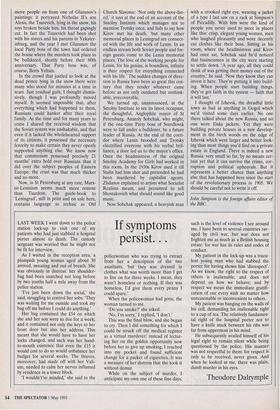If symptoms
persist. .
LAST WEEK I went down to the police station lock-up to visit one of my patients who had just stabbed a hospital porter almost to death. The custody sergeant was worried that he might not be fit for interview.
As I waited in the reception area, a plumpish young woman aged about 30 arrived, sweating and out of breath. She was obviously in distress: her shoulder- bag had been snatched not long before by two youths half a mile away from the police station.
`I've just been down the social,' she said, struggling to control her sobs. 'They was waiting for me outside and took my bag off me before I could do anything.'
Her bag contained the £54 on which she and her son were to live for a week; and it contained not only the keys to her front door but also her address. This meant that she would have to have her locks changed, and such was her hand- to-mouth existence that even the £15 it would cost to do so would unbalance her budget for several weeks. The thieves, moreover, had made off with her Vali- um, needed to calm her nerves inflamed by residence in a tower block.
`I wouldn't've minded,' she said to the policewoman who was trying to extract from her a description of the two assailants, 'but they was dressed in clothes what was worth more than I get to live on for three weeks. I mean, they wasn't homeless or nothing. If they was homeless, I'd give them every penny I could spare.'
When the policewoman had gone, the woman turned to me.
`Do you smoke?' she asked.
`No, I'm sorry,' I replied, 'I don't.'
This was the final blow, and she began to cry. Then I did something for which I could be struck off the medical register as a virtual murderer: instead of lectur- ing her on the golden opportunity now before her to give up smoking, I reached into my pocket and found sufficient change for a packet of cigarettes. It was a measure of her distress that she took it without demur.
While on the subject of murder, I anticipate my own one of these fine days, such is the level of violence I see around me. I have been to several countries rav- aged by civil war, but war does not frighten me as much as a British housing estate: for war has its rules and codes of conduct.
My patient in the lock-up was a trucu- lent young man who had stabbed the porter for having shown him 'disrespect'. As we know, the right to the respect of others is inalienable, and does not depend on how we behave; and by respect we mean the immediate gratifi- cation of our every wish no matter how unreasonable or inconvenient to others.
My patient was banging on the walls of his cell, demanding his inalienable right to a cup of tea. The relatively fundamen- tal right of the hospital porter not to have a knife stuck between his ribs was far from uppermost in his mind.
He subsequently availed himself of his legal right to remain silent while being questioned by the police. His manner was not respectful to them: for respect is only to be received, never given. And when he looked at me, there was plain, dumb murder in his eyes.
Theodore Dalrymple


























































 Previous page
Previous page